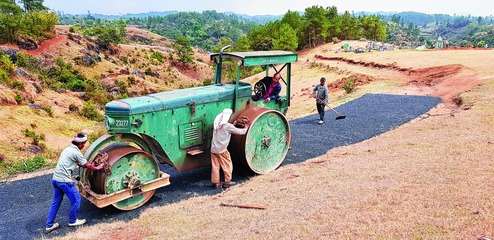
Guwahati: Residents of Nongkynjeng village in Meghalaya's West Khasi Hills can thank Padma Shri Rajagopalan Vasudevan from Tamil Nadu for two reasons, his technology which has made their road more durable and offered a solution to the growing problem of plastic waste.
A 1km road was constructed in the village recently by mixing shredded plastic waste with heated bitumen, a technology developed by Coimbatore-based Vasudevan years ago, that makes the road more durable and solves the waste problem in urban areas.
More than 1-lakh km roads in at least 11 states have been constricted by using his technology, which was patented in 2006. But this is the first such construction in the Northeast, a region where roads get damaged often owing to floods and landslides.
"We have used 470 kg plastic waste like polythene carry bags, plastic cups, chips packets and foam packaging for the road. The waste was collected from the district headquarters Nongstoin and Shillong which would have otherwise littered our roads. This is a cost-effective work as we spent only Rs 33 lakh for the 1km road. If all roads in Meghalaya are built using this technology, we can get rid of the plastic menace," West Khasi Hills deputy commissioner Arunkumar Kembhavi told The Telegraph, adding that finesse and finishing of the road was as good as any national highway.
The road was constructed under the Meghalaya Livelihoods and Access to Markets Projects (Megha-Lamp) and MGNREGS. The Megha-Lamp project was launched in September 2015 to provide access to markets and value chains to enhance livelihood of farmers.
"According to a World Economic Forum report, plastic can make roads more durable against changing weather - floods, extreme heat and cold. It has less water-carrying capacity than normal roads meaning no cracks, potholes or craters. They are not only greener but are also stronger and maintenance-free and last about three times as long as a conventional road. It also reduces the quantity of bitumen used," Kembhavi said.
Two more roads - Nonglwai I and Nonglwai II - are also being built with the same technology, which are likely to be completed by the end of this month, he said.
Vasudevan, a chemistry professor from Madurai, used finely-shredded plastic waste, a technology which generated much interest in Japan and China. But he chose to share the technology with the Indian government free of cost.










